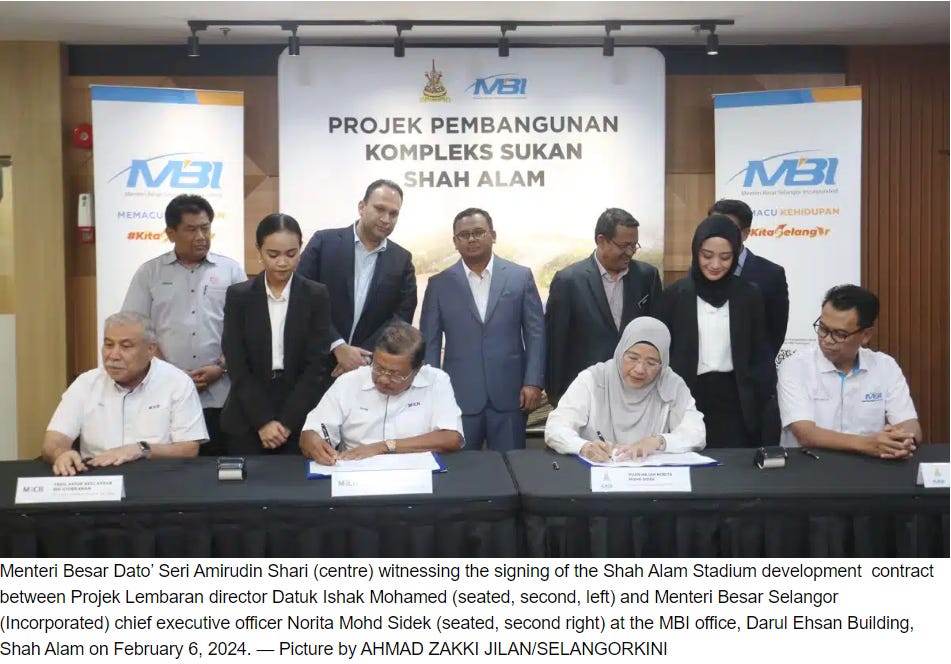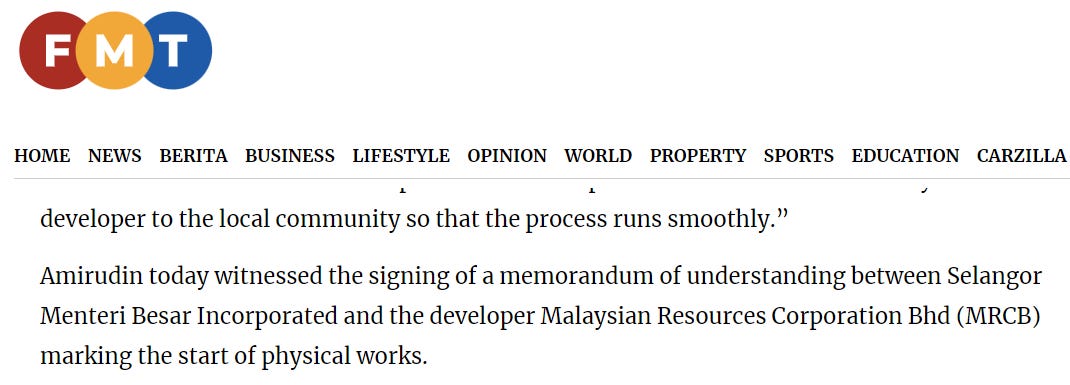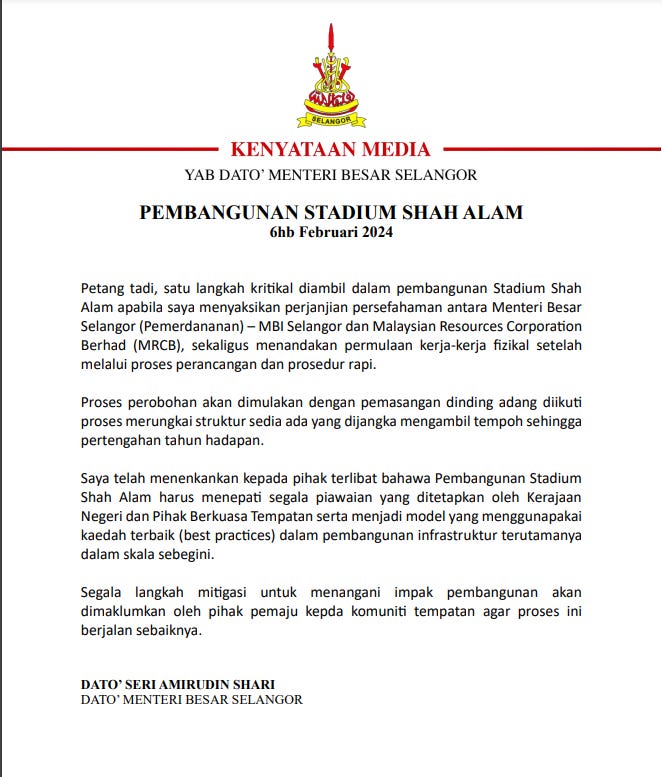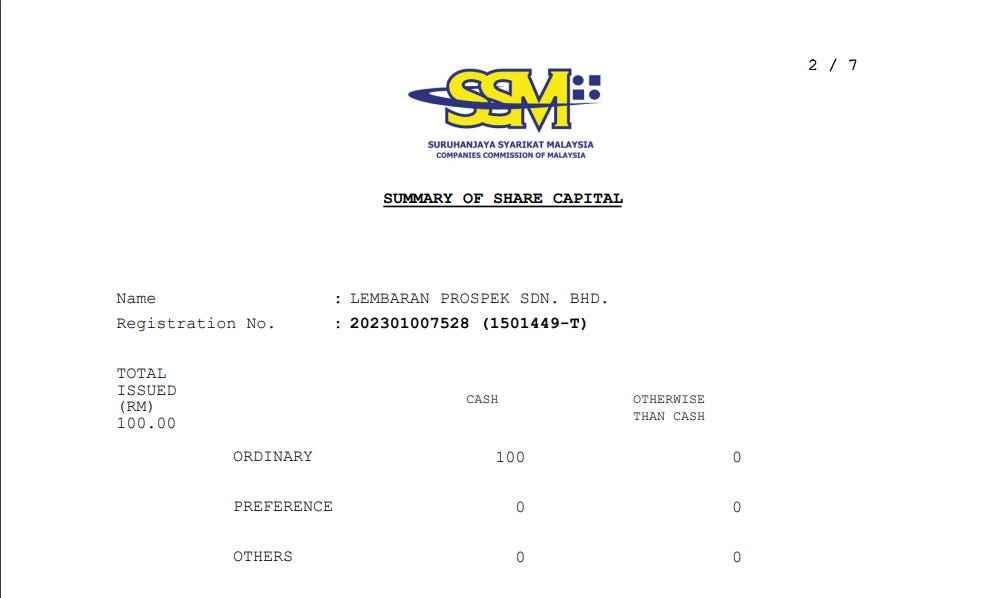MRCB receives ‘go ahead’ to demolish the Shah Alam Stadium
Will the Shah Alam Stadium be demolished on the basis of a non-legally binding MOU?
The Shah Alam Stadium is expected to be fully demolished by mid-2025, according to Selangor Menteri Besar, who recently witnessed the signing of a memorandum of Understanding (MOU) with the developer Malaysian Resources Corporation Berhad (MRCB), according to FMT.
The report further states that the process of stadium demolition has already started.
However, this is occurring through what appears to be a special purpose vehicle of MRCB, Lembaran Prospek Sdn Bhd, formed last year with RM100 capital.
The demolition of Shah Alam Stadium appears to be occurring upon the basis of an MOU, which has no legal obligations. An MOU is not a contract of award. It shows only an intention of two parties to look into and negotiate a project or deal at sometime in the future.
Something real ‘fishy’ is going on here
This leaves the state of Selangor in a risky position, should any parties just withdraw. Selangor state has no legal standing. Such a situation occurred in Perlis in the 1980s when the contractor to build the Timoh Tasik dam abandoned the project, after logging the proposed dam area.
The signing of only an MOU, suggests that all terms and conditions of the Shah Alam Stadium site project have not been all agreed to. It can only be speculated upon which aspects of the agreement are not finalized, such as the unusual method of land swaps as a substitute for monetary consideration.
Up until the time of writing, MRCB has not informed Bursa Malaysia of the Shah Alam Stadium project.
As Menteri Besar Incorporated (MBI) is the Selangor state vehicle for the project, how will all the parcels of public land be transferred to MBI to use as payment to the project contractor?
This also leaves the question of why did the Shah Alam City Council (MBSA) issue the permission to demolish the stadium, when as of today, there is still no official agreement between the state of Selangor and any contractor? This is the first time in Selangor’s history that a demolition approval letter has been issued without any contractor appointed.
Reasons given for necessity of project just don’t add up
One of the major reasons given for the urgency of the stadium demolition was the area’s prone to flooding. However, in the last federal budget RM 550 million was allocated to alleviate flooding within the area. Another reason given was that the structure of the stadium was unsound. However, the JKR inspection of the site before the original tender process to refurbish the stadium did not report any such faults.
In actual fact, this stadium project could have been undertaken for les than RM 100 million, rather than the RM 3.28 billion. It would have also prevented 3.28 billion worth of choice state land being handed over to a private corporation.
The question of whether a new commercial centre and hotel in Shah Alam is actually needed. The Selangor state allowed the Hotel Carlton to run down, where it has been closed for two years. Why does a new hotel need to be built when one was allowed to deteriorate?
Stakeholders in the Shah Alam Stadium project have employed bloggers and even a public university UNIMAP to deflect attention away from the issues involved. The Shah Alam Stadium issue has undermined the trust of Selangor voters, according to activist Abdul Razak Ismail. MRCB has taken Abdul Razak to court on accusations of defamation, but lost and application for an injunction against him.
Pakatan Harapan lost eight seats in the recent Selangor state elections, while pushing through the stadium project.
Subscribe Below:








What on earth is a non legally binding MOU? An MOU is an intention by multiple parties to enter into an agreement. ether or not it is binding or capable binding the parties depends on the drafting of the document. Otherwise it is an expression to enter into an agreement subject to consideration and certainty as to the terms and conditions. An MOU alone does not satisfy the conditions and terms of a contract which is binding or can be binding. An MOU can be binding if the parties satisfy certain conditions that bind them. But a general assumption that an MOU is legally binding or not binding is absurd.